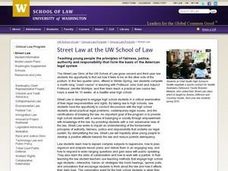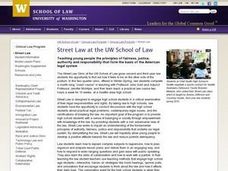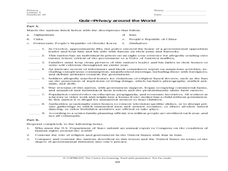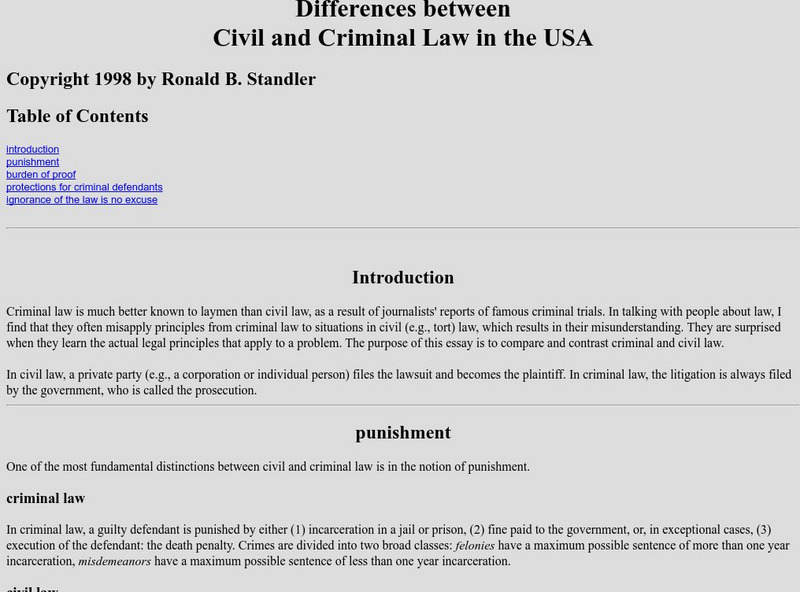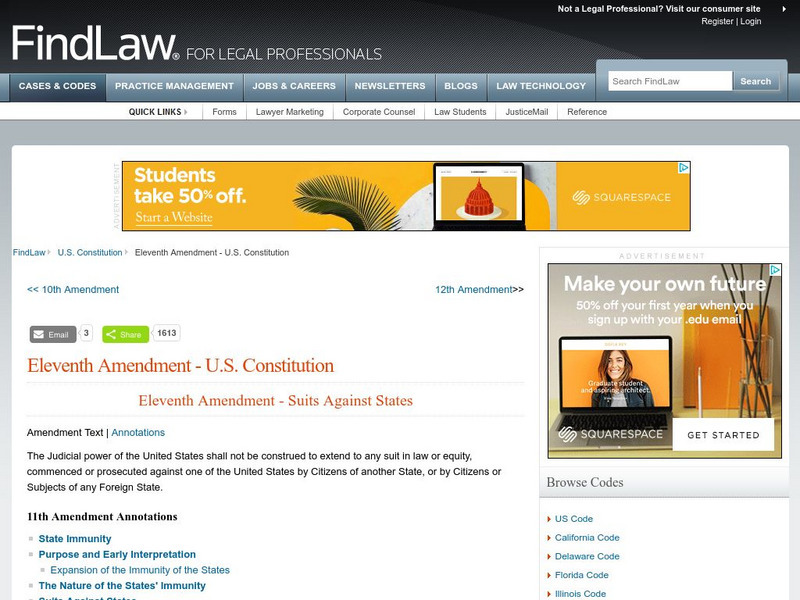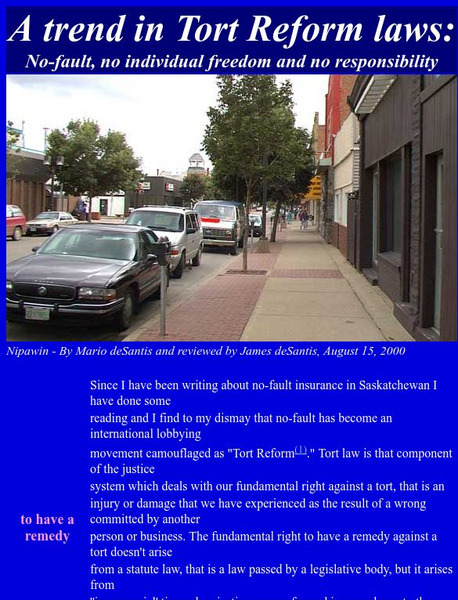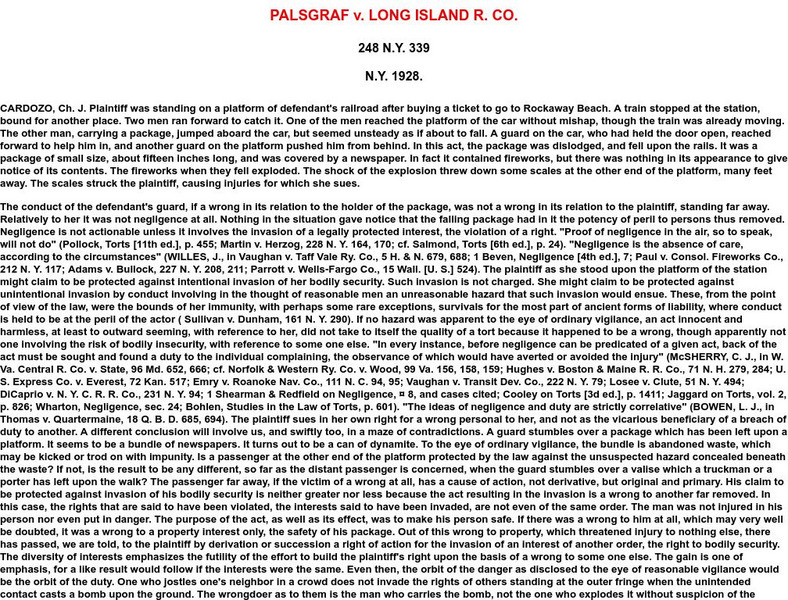Curated OER
Tort Law
Young scholars study the concept of negligence. They recognize the difference between civil and criminal law and examine the factors that courts consider when considering if there is a duty and whether it has been breached. They argue...
Curated OER
Torts
Students examine tort law and defenses to negligence claims. They read case studies, participate in a mock trial, answer questions about the case summaries, and present information to their group about tort law.
Curated OER
Enriching Students' Understanding of Criminal and Tort Law Using Technology
Students define criminal and tort law and explain how they are different.
Curated OER
Tort Law -- Negligence
Students review the differences between criminal and civil law. In groups, they examine high-profile cases and identify any act of negligence. They create a list of the elements of negligence and answer discussion questions as they watch...
Curated OER
Torts: Intentional Torts
Students are introduced to the concept of intentional torts. In groups, they compare and contrast civil and criminal wrongs committed by people. They are given case studies and use the elements of torts to apply to them. They share their...
Curated OER
Tort Hypotheticals
Students review the use of intentional torts. In groups, they use specific statements and use them in hypothetical situtations. For each category, they write a statements about the situation and discuss them as a class. They complete a...
Curated OER
Toxic Torts
Twelfth graders examine the role of courts in environmental law enforcement. Using examples, they identify civil cases brought against large corporations for violating environmental laws. They define new vocabulary and discuss the...
Curated OER
Introduction to Contracts
High schoolers are introduced to the concept of contracts in street law. In groups, they compare and contrast contract law with tort law. They identify the basic concepts of each and view examples to see the concepts in use. They also...
Curated OER
Law: Products Liability
Students examine the three theories of products liability and how tort law effects consumers. They investigate a case study and either represent the plaintiff or the defendant. After presenting their arguments, classmates vote as judges.
School Improvement in Maryland
Court Proceedings Civil Cases
What's the difference between civil and criminal law? How do the court proceedings differ in these two types of trials? How do the standards of proof differ? Why do these differences exist? As part of their examination of the...
Curated OER
Tort Liability: Mock Trial
Students explore the trial process and the tort concept of host liability.
Curated OER
Torts (A/V)/Negligence/Damages
Students explore what it means to be responsible community members/citizens. They consider their duty to act as reasonable people under the circumstances and analyze a negligence case (duty, breach, damages). They detrmine their legal...
Curated OER
The Law in the North And South As It Relates To Business From the 1900's To the 1990's
Students study how laws are different in other states and how some of the laws are the same. They examine the steps that must be taken to get a divorce in Connecticut, North Carolina, and South Carolina. They take a look at the laws...
Street Law
Mock Trial - Brooks v. Lawrence and the Metro City Police Department
An incident with a Swiss Army knife leads to a suit against the police department for battery, false arrest, and intentional infliction of emotional distress in the Brooks v. Lawrence & the Metro City Police Department mock...
Curated OER
Privacy around the World
Eleventh graders examine how nations around the world restrict the privacy of their citizens. In this American Government lesson, 11th graders compare the freedoms of US citizens with those of people living in other nations.
Other
Expert Law: Negligence and Tort Law
Written by lawyer Aaron Larson, this article provides simple definitions and explanations and is organized into the following sections: "Proximate Cause," "The Elements of Negligence Action," "Gross Negligence," "Children and...
Thomson Reuters
Find Law: Legal Blog Network
This resource provides a network of legal blogs on every type of law and provides the latest news about court cases including the U.S. Supreme Court.
Other
Differences Between Civil and Criminal Law in the Usa
This website provides a well-organized introduction to the differences between civil and criminal law. Addresses topics such as "punishment," "burden of proof," "protections for criminal defendants" and "ignorance of the law." Examples...
Thomson Reuters
Find Law: u.s. Constitution: Eleventh Amendment
This resource gives the text of the Eleventh Amendment. Additionally, annotations are provided, which cite case law and other pertinent information.
Other
North Central Internet News: Trend in Tort Reform Laws
"No fault, no individual freedom, no responsibility" - a commentary on Tort Reform and, in the opinion of the writer, a camouflage to end the fundamental right to have remedy when injury or damage occurs as the result of a wrong...
Other
Streetlaw: Torts
Chapters in this collection of online resources are "Torts: A Civil Wrong," "Intentional Torts," "Negligence," "Strict Liability," and "Torts and Public Policy." Provides links to both simple definitions and in-depth explanations of tort...
Other
Law School help.com: Torts: Negligence
In addition to defining "negligence" and "tort," this article provides information on "negligence and ordinary care," "contributory negligence," "presumption of negligence," and related topics.
Other
Law School help.com: Torts: Fraud and Deceit
A good introduction to fraud and intentional torts, this website provides definitions of several terms including "Deceit," "Intentional misrepresentation," "Expression of opinion," "Concealment," "Nondisclosure of known facts," and...
Other
Law School help.com: Palsgraf v. Long Island R. Co.
This website provides information on the New York court case "Palsgraf v. Long Island Railroad Company." Learn about the events that led to the trial as well as the outcome of the case.


